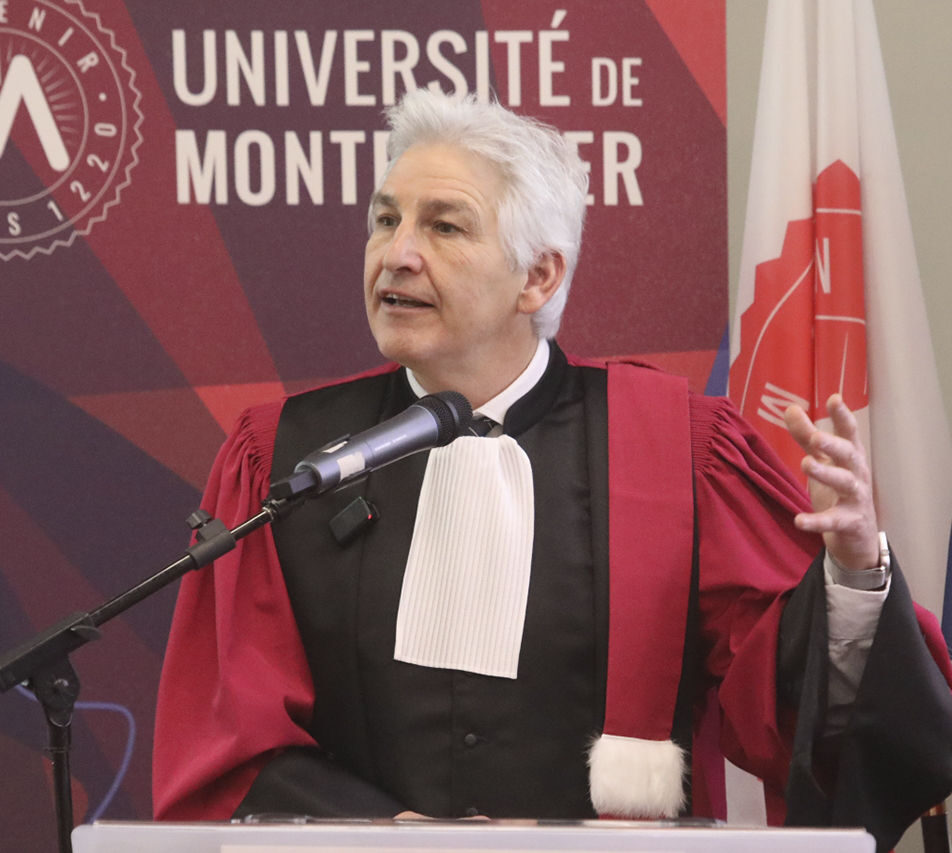Philippe Dubois: under the banner of green chemistry
An advocate for green and responsible chemistry, Professor Philippe Dubois is an internationally renowned researcher in chemistry and materials science, particularly for his cutting-edge research on bioplastics. His innovative processes have led to numerous patented applications in industry, highlighting the essential role of chemistry in the ecological transition. As President and Rector ofthe University of Mons (UMons), located in French-speaking Belgium, he attaches as much importance to the international reputation of his institution as to the well-being of its students, teachers, and researchers. He was awarded an honorary doctorate from the University of Montpellier on January 31, 2024.

When you look at the career of Belgian researcher Philippe Dubois, the figures speak for themselves: more than 800 peer-reviewed scientific publications, 76 patents filed (nearly a quarter of which have led to the industrialization of innovative products and processes) and numerous awards (see box below). As Sébastien Clément, director of the Chemistry Department at the Faculty of Sciences in Montpellier and sponsor of his honorary doctorate nomination, points out, "Philippe Dubois is an eminent researcher whose academic career has been marked by an unwavering passion for science and innovation."
And that's an understatement. Born in Charleroi in 1965, from a modest working-class background (his father was a miner, his mother a housewife), Philippe Dubois stood out early on with an undeniable appetite for science, a discipline in which he excels. After completing a master's degree in organic chemistry at the Facultés universitaires Notre-Dame de la Paix in Namur, he wrote a doctoral thesis in polymer chemistry entitled "Molecular engineering of biocompatible and biodegradable materials by ring opening of lactones and lactides," which he completed with honors at the University of Liège. This work led to his first patent in 1989 and several scientific publications. The study of biocompatible and biodegradable polymers was already central to his work. And it would remain so. Following an initial industrial post-doctorate at Dow Chemicals in Holland, he became a research fellow, then a qualified researcher at the FNRS (National Fund for Scientific Research) at the University of Liège. In 1994, he completed a second post-doctorate in chemical engineering of bio-based polymer materials at Michigan State University in the United States. He also filed his second patent.
At the crossroads of synthetic chemistry and materials engineering
In 1997, Philippe Dubois joinedthe University of Mons-Hainaut (which became the University of Mons in 2009 after a merger) as a specialist in macromolecular synthetic chemistry and founded the Polymer and Composite Materials Department (SMPC) as part of the Materia Nova center of excellence. He was appointed professor (1999) and then full professor (2003), teaching organic chemistry, macromolecular chemistry, and industrial chemistry, among other subjects. Thanks to his expertise, he is a visiting professor at numerous institutions in Belgium and around the world (United States, China, Saudi Arabia, etc.). The Belgian researcher has established himself as an advocate of green chemistry committed to ecological transition through pioneering research promoting interdisciplinarity at the crossroads of synthetic chemistry and materials engineering.
"Plastics are omnipresent in our lives, whether in automobiles, construction, public works, or packaging, with more than 400 million tons produced worldwide each year," explains Sébastien Clément. In order to improve the ecological footprint of these plastics, Philippe Dubois was one of the first in Europe to demonstrate the potential of local and renewable bio-resources for the production of plastics, thus making it possible to move away from oil as a raw material."Among the many innovations that have emerged thanks to the work of the Belgian scientist's teams, one major discovery is particularly noteworthy. "The first continuous production process for bio-based and biodegradable plastic, which is the most industrialized today, polylactic acid or PLA, was developed using a catalytic system that can be used in reactive exclusion, patented by Professor Philippe Dubois' team," adds the director of the Chemistry Department at the Faculty of Sciences in Montpellier, with admiration. Another area of research, another industrial application: the very first anti-biofouling paint free of any bactericide, which prevents the proliferation of marine organisms on boat hulls, leading to massive fuel savings while protecting the marine environment. Philippe Dubois is also working on the recyclability of bio-based polymers using enzymology, with the aim of drastically reducing the amount of waste produced.
Promoting research and knowledge transfer
Alongside this cutting-edge research, Philippe Dubois is also deeply involved in the administration ofthe University of Mons. Vice-Dean of the Faculty of Science (2002-2005) and Chair of the Chemistry Department (2003-2007), he also served as advisor to the rector on scientific research (2006-2009). At the same time, he brought together research in the field of polymers through the creation of the Center for Innovation and Research in Polymer Materials (CIRMAP) in 2007 (which he headed until 2016), while also serving as co-chair of the Institute for Research in Materials Science and Engineering (2012-2016). As scientific director of the Materia Nova asbl research center, which he helped to set up, Philippe Dubois, aware of the importance of links between research, innovation, and industry, took part in the creation of the spin-off GATE2 S.A., a platform for promoting the technologies and processes developed and patented by Materia Nova. After a sabbatical year during which he founded the National Composite Center (affiliated with LIST) in Luxembourg, he was elected Rector-President ofthe University of Mons in 2018 (he was previously Vice-Rector for Research) and re-elected for four years in 2022.
Strong collaborative ties
This role gives Philippe Dubois the opportunity to put "students at the center of his concerns, "as he himself puts it. And this is not just empty rhetoric. "He is someone who is deeply committed to his role as rector from an educational perspective," says Sébastien Clément. The Montpellier-based researcher is well placed to know this. "Philippe Dubois has been a mentor to a whole generation of scientists, sharing his knowledge and advice with passion and always with a smile. I was one of the researchers he supervised during his career. Our paths crossed a little over 15 years ago during my postdoctoral fellowship. His first words were: 'Settle in, get your bearings, and we'll discuss the project later.' These words perfectly illustrate his human qualities and his desire to provide a fulfilling working environment for his researchers, conducive to the success of his laboratory."
This initial shared professional experience led to further collaborations once Sébastien Clément was recruited by the University of Montpellier in 2009. Together, they supervised two joint theses and helped forge strong links between the two universities, both in terms of research and teaching. With an Erasmus+ agreement signed in 2023 between the Faculties of Science of Mons and Montpellier, new joint projects are already being considered. Despite his strong regional roots, Philippe Dubois has not lost sight of the importance of promoting his university internationally, which is why he is the president of the European University EUNICE. Another point in common betweenthe University of Mons and the University of Montpellier is the latter's strong involvement inthe European University CHARM-EU. This proves that research and teaching are solid foundations for building a sustainable and committed future together.
The price of science
Considered one of Belgium's most influential scientists, Philippe Dubois has received numerous awards throughout his career, including the prestigious FNRS Five-Year Prize in Applied Sciences 2011-2015, presented by King Philippe of Belgium himself. A member of the Royal Academy of Belgium and the European Academy of Sciences, he is ranked18th in Thomson-Reuters' top 100 global researchers in materials science for 2000-2010 and in Stanford University's Top 2% World Scientists for 2020. Rector-President ofthe University of Mons, he is Scientific Director of the Materia Nova research center, Honorary Qualified Researcher at the FNRS, Adjunct Professor at the University of Liège, and Visiting Professor at the University of Namur and numerous higher education institutions abroad (USA, China, France, Luxembourg, etc.).
